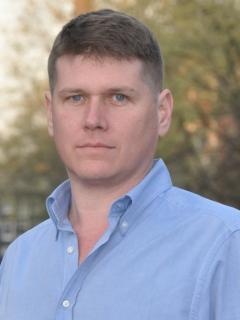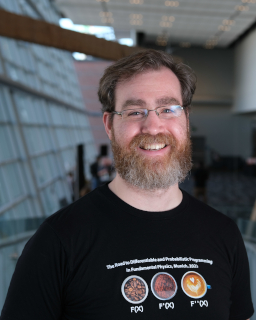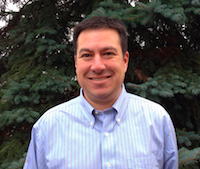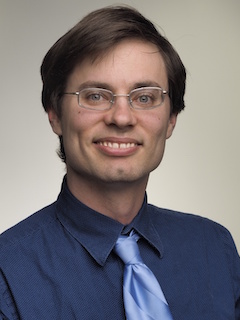Training, Education and Outreach
Quick links
Introduction
The long-term sustainability of the research software ecosystem is particularly important for HEP, given that the HL-LHC and other facilities of the 2020s will be relevant through at least the 2030s. The IRIS-HEP Software Sustainability Core (SSC) focuses on activities which promote the long-term sustainability of the software. The SSC has primarily focused on Training, Education and Outreach.
To implement this vision, IRIS-HEP has developed a program to provide software training paths from a researcher’s first steps through more regular, active contribution along with its partners: HSF, FIRST-HEP and the Carpentries. In particular, it has developed an introductory HEP software curriculum and several software modules on techniques and methods for computing and data science. The training program has enabled HEP users to jump start their research and contribution to the field. The common efforts on training across HEP has helped build a strong sense of community.
Our efforts have established a platform from where we can scale and sustain our training efforts. Our training vision is reflected in the pyramid below.
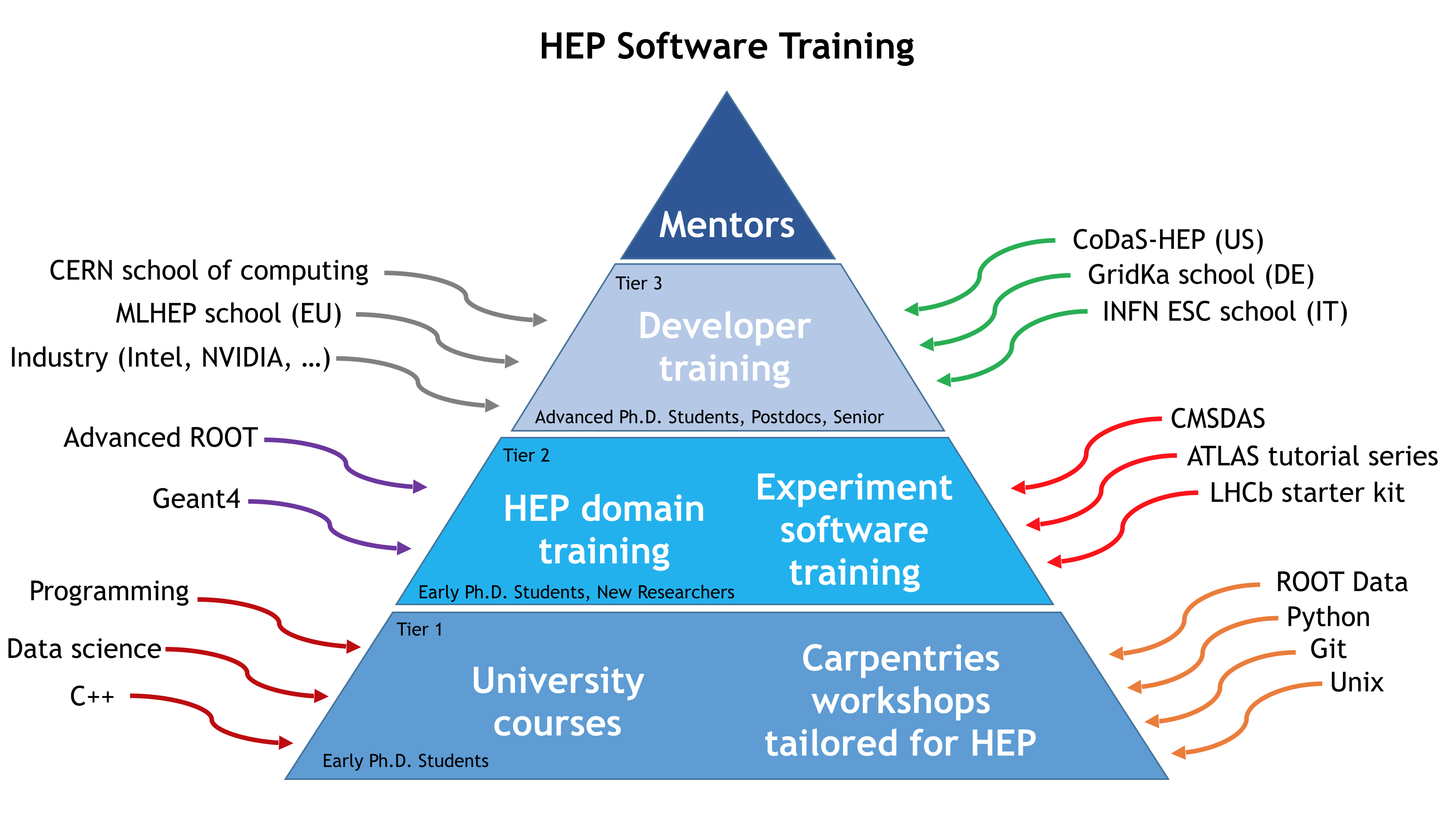
A vision for training in HEP: researchers progress (vertically) from basic skills training, through user training in existing software to training in skills needed to develop new research software.
Computational and Data Science for High Energy Physics (CoDaS-HEP) Summer School
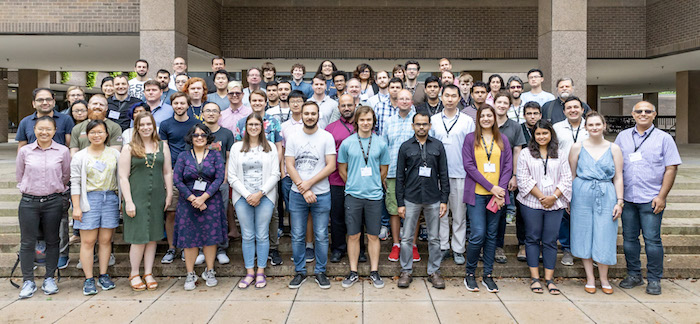
Group photo of participants of the 3rd summer school on tools, techniques and methods for Computational and Data Science for High Energy Physics (CoDaS-HEP) at Princeton University on July 22-26, 2019.
IRIS-HEP team members help organize events, develop training material and participate as lecturers at all levels of this training vision. We organize and run the annual Computational and Data Science for High Energy Physics (CoDaS-HEP) summer school at Princeton and provide additional professional development for the most advanced students and postdocs by supporting connections with mentors through the IRIS-HEP Fellows Program. Integrated with this is a robust outreach program to engage local communities. This is essential to train STEM students in software at K-12 level by partnering with their teachers. These steps create a workforce capable of solving software challenges in general and those of HEP in particular.
Best Practices
IRIS-HEP continues to document, disseminate, and work towards community adoption of the best practices (from HEP and beyond) in the areas of software sustainability, including topics in software engineering, data/software preservation, and reproducibility. Of particular importance are best practices surrounding the modernization of the software development process for scientists.
Upcoming and Recent Training and Outreach Events
- 30 Jul - 31 Jul, 2026 - US ATLAS / IRIS-HEP Analysis Software Training Event 2026 (University of Arizona)
- 1 Jun - 2 Jun, 2026 - USCMS / IRIS-HEP Analysis Software Training Event 2026 (University of Maryland)
- 10 Dec - 10 Dec, 2025 - HSF/IRIS-HEP Python for Analysis Training (Virtual) (Virtual)
- 17 Nov - 18 Nov, 2025 - PR Teachers Workshop on Python programming with applications to particle physics (Educational Department of Puerto Rico, Sala de los Secretarios (San Juan (PR)))
- 9 Sep - 9 Sep, 2025 - HSF/IRIS-HEP Python for Analysis Training (Virtual)
- 3 Sep - 4 Sep, 2025 - HSF/IRIS-HEP Software Basics Training (Virtual) (Virtual)
- 28 Jul - 31 Jul, 2025 - JuliaHEP 2025 Workshop (Princeton University)
- 24 Jul - 25 Jul, 2025 - US ATLAS / IRIS-HEP Analysis Software Training Event 2025 (University of Michigan)
- 21 Jul - 25 Jul, 2025 - CoDaS-HEP 2025 - Computational and Data Science Training for High Energy Physics (Princeton University)
- 21 Jul - 26 Jul, 2025 - Coding Camp 1 - Virtual (Virtual)
- 13 Jul - 18 Jul, 2025 - Coding Camp 1 in Spanish (virtual) at UPRM Puerto Rico (University of Puerto Rico Mayaguez)
- 13 Jul - 18 Jul, 2025 - 2025 Quarknet Data Camp at Fermilab (Fermilab)
- 7 Jul - 9 Jul, 2025 - Coding Camp at Siena College (NY) (Siene College (NY))
- 30 Jun - 2 Jul, 2025 - Coding Camp at Brookhaven-Stony Brook (Brookhaven-Stony Brook NY)
- 23 Jun - 26 Jun, 2025 - Coding Camp at University of Alabama (Tuscaloosa) (University of Alabama (Tuscaloosa))
- 23 Jun - 25 Jun, 2025 - Coding Camp (Spanish) at Physics Department, UPRM (Mayaguez, PR) (University of Puerto Rico Mayaguez)
- 18 Jun - 20 Jun, 2025 - HSF/IRIS-HEP Software Basics Training (In person at CERN Kjell Johnsen Auditorium)
- 11 Jun - 13 Jun, 2025 - Coding Camp in Spanish at University Gardens High School - Hato Rey Sur - San Juan - Puerto Rico (University Gardens High School Puerto Rico)
- 9 Jun - 11 Jun, 2025 - Coding Camp at Rice University Houston (Rice University (Houston, TX))
- 2 Jun - 4 Jun, 2025 - Coding Camp at CROEM High School - Mayaguez - Puerto Rico (CROEM High School Mayaguez Puerto Rico)
- 19 May - 20 May, 2025 - USCMS / IRIS-HEP Analysis Software Training Event 2025 (Rice University)
- 24 Mar - 28 Mar, 2025 - HSF/IRIS-HEP Analysis Reproducibility (Virtual) (Virtual)
- 19 Oct - 20 Oct, 2024 - HSF Training Pre-CHEP Workshop (University in Kraków, Poland)
- 22 Jul - 26 Jul, 2024 - CoDaS-HEP 2024 - Computational and Data Science Training for High Energy Physics (Princeton University)
- 21 Jul - 26 Jul, 2024 - Coding Camp - Fermilab (Fermilab)
- 18 Jul - 19 Jul, 2024 - US ATLAS / IRIS-HEP Analysis Software Training Event 2024 (University of Washington)
- 25 Jun - 27 Jun, 2024 - Coding Camp - Nebraska (University of Nebraska Lincoln)
- 24 Jun - 26 Jun, 2024 - Coding Camp - Puerto Rico (University of Puerto Rico Mayaguez)
- 20 Jun - 21 Jun, 2024 - USCMS/IRIS-HEP Software Training (Princeton University)
- 5 Jun - 5 Jun, 2024 - HSF/IRIS-HEP Python for Analysis Training (Virtual) (Virtual)
- 20 May - 21 May, 2024 - HSF/IRIS-HEP Software Basics Training (Virtual) (Virtual)
- 24 Apr - 26 Apr, 2024 - Joint ATLAS / IRIS-HEP Kubernetes Hackathon (University of Chicago)
- 26 Feb - 1 Mar, 2024 - Training on Analysis Pipelines (Virtual)
- 22 Nov - 22 Nov, 2023 - HSF/IRIS-HEP Python for Analysis Training (Virtual) (Virtual)
- 13 Nov - 14 Nov, 2023 - HSF/IRIS-HEP Software Basics Training (Virtual) (Virtual)
- 23 Jul - 28 Jul, 2023 - Coding Camp 2 (Fermilab) (Fermilab)
- 17 Jul - 21 Jul, 2023 - CoDaS-HEP 2023 - Computational and Data Science Training for High Energy Physics (Princeton University)
- 13 Jul - 14 Jul, 2023 - HSF/IRIS-HEP Software Basics Training (Virtual) (Virtual)
- 12 Jul - 12 Jul, 2023 - HSF/IRIS-HEP Python for Analysis Training (Virtual) (Virtual)
- 10 Jul - 12 Jul, 2023 - Coding Camp (Virtual)
- 10 Jul - 12 Jul, 2023 - Coding Camp - Univ of Washington, Seattle (Washington, Seattle)
- 20 Jun - 21 Jun, 2023 - Coding Camp 0 (Virtual)
- 19 Jun - 21 Jun, 2023 - Coding Camp - Rice University (Rice University, Houston)
- 5 Jun - 6 Jun, 2023 - IRIS-HEP Python Training for CROEM teachers (CROEM Mayaguez, Puerto Rico)
- 5 Jun - 7 Jun, 2023 - Coding Camp - University of Alabama Touscaloosa (University of Alabama Touscaloosa)
- 8 Feb - 10 Feb, 2023 - HSF/IRIS-HEP Software Basics Training (Virtual) (Virtual)
- 16 Jan - 20 Jan, 2023 - Analysis Preservation Workshop (Virtual)
- 28 Sep - 30 Sep, 2022 - HSF/IRIS-HEP Software Basics Training (Virtual) (Virtual)
- 1 Aug - 5 Aug, 2022 - CoDaS-HEP 2022 - Computational and Data Science Training for High Energy Physics (Princeton University)
- 25 Jul - 25 Jul, 2022 - Matplotlib training hackathon (Virtual)
- 19 Jul - 23 Jul, 2022 - DANCE/CoDaS@Snowmass 2022 computational and data science software training event (Seattle (University of Washington))
- 13 Jul - 15 Jul, 2022 - Software Carpentry (Virtual) (Virtual)
- 16 Jun - 24 Jun, 2022 - Git/Github for IRIS-HEP Summer 2022 Fellows (Virtual)
- 23 May - 25 May, 2022 - Analysis Ecosystems Workshop II (IJCLab, Orsay, Paris)
- 25 Apr - 26 Apr, 2022 - IRIS-HEP AGC Tools 2022 Workshop (Virtual)
- 21 Apr - 22 Apr, 2022 - Matplotlib Training (Virtual) (Virtual)
- 28 Mar - 30 Mar, 2022 - Software Carpentry (Virtual) (Virtual)
- 5 Mar - 5 Mar, 2022 - Data Analysis for Lab Research (Virtual)
- 13 Dec - 15 Dec, 2021 - Software Carpentry (Virtual) (Virtual)
- 3 Nov - 4 Nov, 2021 - IRIS-HEP AGC Tools 2021 Workshop (Virtual)
- 1 Nov - 1 Nov, 2021 - HSF IRIS-HEP Training Challenge 2 (Virtual)
- 25 Aug - 27 Aug, 2021 - Software Carpentry (Virtual) (Virtual)
- 24 Aug - 25 Aug, 2021 - Arduino Micro Controller and C++ programming (STEM Teachers) (University of Puerto Rico Mayaguez (UPRM) and CROEM High School)
- 28 Jun - 28 Jun, 2021 - HEP Software Training Challenge (Workshop) (Virtual)
- 15 May - 16 May, 2021 - Arduino Micro Controller and C++ programming (STEM Teachers) (University of Puerto Rico Mayaguez (UPRM))
- 13 Feb - 14 Feb, 2021 - Machine Learning Basics for STEM teachers (Virtual) -- 8 students.
- 18 Jan - 22 Jan, 2021 - C++ Course and Hands-on Training (Virtual) -- 75 students.
- 2 Nov - 9 Nov, 2020 - ML + GPU Training (Online) -- 40 students.
- 12 Oct - 16 Oct, 2020 - C++ Course and Hands-on Training (Virtual) -- 48 students.
- 27 Jul - 30 Jul, 2020 - Virtual Docker Training (Online) -- 173 students.
- 15 Jul - 16 Jul, 2020 - UPRM STEM K-12 Workshop 2020 (University of Puerto Rico Mayagüez) -- 16 students.
- 20 Jun - 20 Jun, 2020 - STEM. IRIS Quarknet UPRM June 2020 (Zoom) (University of Puerto Rico Mayagüez) -- 11 students.
- 17 Feb - 19 Feb, 2020 - Analysis Preservation Bootcamp (CERN) -- 70 students.
- 27 Nov - 29 Nov, 2019 - Software Carpentry Training at CERN (CERN) -- 60 students.
- 19 Aug - 23 Aug, 2019 - ATLAS Software Carpentries Training (LBNL) -- 40 students.
- 22 Jul - 26 Jul, 2019 - CoDaS-HEP 2019 (Princeton University) -- 50 students.
- 3 Jun - 4 Jun, 2019 - An introduction to programming for STEM teachers (University of Puerto Rico at Mayaguez) -- 16 students.
- 6 May - 8 May, 2019 - Analysis Description Languages Workshop (Fermilab)
- 1 Apr - 2 Apr, 2019 - Software Carpentry Workshop (FNAL)
- 23 Jul - 27 Jul, 2018 - CoDaS-HEP 2018 (Princeton University)
- 10 Jul - 13 Jul, 2017 - CoDaS-HEP 2017 (Princeton University)
Links for more information:
- HSF Training Events: Check out ongoing training activities here.
- Community: Engage and find out more about the HSF training community here.
- Request or help organize training: Click here to request and organize a training.
- Selected training resources
- All HSF training modules.
- OSG 2020 Virtual School Pilot
- HSF training videos on YouTube.
- Software Carpentry lessons.
- Most recent SIDIS/HSF C++ course lectures (Scroll to the end of the page to find them)
- All HSF training modules.
Questions/Ideas? Contact Sudhir Malik (sudhir.malik@upr.edu)
Current and Previous SSC Fellows
SSC Presentations
- 19 Oct 2024 - "CoDaS-HEP and US-CMS/US-ATLAS Training", Jim Pivarski, HSF Training Pre-CHEP Workshop
- 19 Oct 2024 - "Analysis of HSF-Training event data", Jim Pivarski, HSF Training Pre-CHEP Workshop
- 22 May 2024 - "Introduction Machine Learning - Tutorial", Gordon Watts, HSF-India HEP Software Workshop at the University of Delhi
- 17 May 2024 - "Panel discussion: Snowmass recommendations on community", Sudhir Malik, DPF-PHENO 2024
- 14 May 2024 - "Software Training as an enabler of community engagement and broader impacts", Sudhir Malik, DPF-PHENO 2024
- 3 May 2024 - "Software Training, community engagement and broader impacts", Sudhir Malik, Invited Seminar by LEPP Journal Club, Cornell University
- 16 Oct 2023 - "GitLab CI/CD", Mason Proffitt, Analysis Preservation BootCamp @ Valencia
- 27 Jun 2023 - "Software Training on HSF and IRIS-HEP", Guillermo Fidalgo, FNAL 2023 New Perspectives Meeting
- 11 May 2023 - "Software Training Outreach In HEP", Sudhir Malik, CHEP2023
- 9 May 2023 - "Building a Global HEP Software Training Community", Sudhir Malik, CHEP2023
- 8 May 2023 - "Training and on-boarding initiatives in HEP", Sudhir Malik, CHEP2023
- 8 May 2023 - "Train to Sustain", Sudhir Malik, CHEP2023
- 22 Nov 2022 - "Workshop Welcome and Goals", Mark Neubauer, Software Citation and Recognition in HEP
- 7 Nov 2022 - "IRIS-HEP/HSF Training Activities", Kilian Lieret, Coordinated Ecosystem Workshop
- 12 Sep 2022 - "Teaching Python the Sustainable Way: Lessons Learned at HSF Training", Guillermo Fidalgo, PyHEP 2022 (virtual) Workshop
- 5 Sep 2022 - "Sustainable Software Training Delivery at the HEP Software Foundation", Sudhir Malik, Sustainable HEP - 2nd edition
- 5 Aug 2022 - "Everything you didn't know you needed", Kilian Lieret, CoDaS-HEP 2022
- 5 Aug 2022 - "Everything you didn't know you needed", Henry Schreiner, CoDaS-HEP 2022
- 1 Aug 2022 - "The Scientific Python Ecosystem", Henry Schreiner, CoDaS-HEP 2022
- 20 Jul 2022 - "Analysis Grand Challenge / HEP Scientific Python Ecosystem", Henry Schreiner, DANCE/CoDaS@Snowmass 2022
- 19 Jul 2022 - "Scientific Python Ecosystem", Henry Schreiner, DANCE/CoDaS@Snowmass 2022
- 6 Jul 2022 - "Grand Challenge of Software Training in HEP", Sudhir Malik, ICHEP 2022 (International Conf. in High Energy Physics) 6 to 13 July 2022 INFN, Bologna, Italy
- 9 May 2022 - "PyROOT tutorial experience from SWC Workshop", Guillermo Fidalgo, 12th ROOT Users' Workshop
- 3 May 2022 - "High-performance Python: GPUs", Henry Schreiner, Princeton Research Computing Training Series
- 26 Apr 2022 - "High-performance Python: CPUs", Henry Schreiner, Princeton Research Computing Training Series
- 24 Feb 2022 - "Understanding Software Community Formation", Daniel S. Katz, Topology Optimization (TOP) Webinar
- 10 Jan 2022 - "Level Up Your Python", Henry Schreiner, Princeton Wintersession
- 1 Dec 2021 - "Software Training in HEP", Sudhir Malik, ACAT 2021 29 Nov - 3 Dec 2021 Virtual and IBS Science Culture Center, Daejeon, South Korea
- 16 Nov 2021 - "Mixing Python and Compiled Codes", Henry Schreiner, Princeton Research Computing Fall 2021 Workshop
- 19 Aug 2021 - "Virtual Meetings Workshop Summary", Mark Neubauer, International Union of Pure & Applied Physics: Particles and Fields Meeting
- 22 Jul 2021 - "AI Ethics: What Physicists Need to Know", Savannah Thais, Snowmass Societal and Environmental Impacts Group Kick Off Town Hall
- 6 Jul 2021 - "Level Up Your Python (Part II)" , Henry Schreiner, PyHEP 2021 Workshop
- 5 Jul 2021 - "Level Up Your Python (Part I)" , Henry Schreiner, PyHEP 2021 Workshop
- 29 Jun 2021 - "Software Training and Sustainable HEP" , Sudhir Malik, Workshop “Sustainable HEP” - transition to a sustainable future in the field of high-energy physics (HEP)
- 21 May 2021 - "Software Training in HEP", Sudhir Malik, 25th International Conference on Computing in High-Energy and Nuclear Physics (vCHEP2021)
- 6 May 2021 - "Day 2 Topics and Goals", Mark Neubauer, Virtual Meetings Blueprint Workshop
- 5 May 2021 - "Welcome, IRIS-HEP Blueprint Activity & Workshop Overview", Mark Neubauer, Virtual Meetings Blueprint Workshop
- 27 Apr 2021 - "IRIS-HEP Training Challenge", Sudhir Malik, IRIS-HEP PI/EB Meeting
- 17 Mar 2021 - "Science Responds and CII: Big Data and Open Science to Combat the Pandemic", Savannah Thais, APS March Meeting
- 17 Mar 2021 - "Physicists and AI Ethics", Savannah Thais, APS March Meeting
- 3 Feb 2021 - "PyHEP Numba tutorial", Jim Pivarski, PyHEP module of the month
- 2 Feb 2021 - "CMake: Best Practices", Henry Schreiner, Software & Computing Round Table
- 20 Jan 2021 - "Level Up Your Python", Henry Schreiner, Princeton Research Computing Bootcamp, Spring 2021
- 12 Jan 2021 - "HSF: Training", Sudhir Malik, Software & Computing Round Table (2021) - Nuclear Physics
- 18 Nov 2020 - "High-performance Python: CPUs", Henry Schreiner, Princeton Research Computing Training Series
- 11 Nov 2020 - "Mixing Python and Compiled Code", Henry Schreiner, Princeton Research Computing Training Series
- 4 Nov 2020 - "Building a Python library", Henry Schreiner, Princeton RSE group
- 4 Nov 2020 - "High-performance Python: CPUs", Henry Schreiner, Princeton Research Computing Training Series
- 20 Oct 2020 - "Machine Learning and Your Research", Savannah Thais, Princeton Research Computing Training Series
- 20 Sep 2020 - "Software Sustainability", Daniel S. Katz, Future Trends in Nuclear Physics Computing
- 11 Aug 2020 - "Education and Engagement of ML Skills", Savannah Thais, Snowmass Computing Frontier Kickoff Meeting
- 11 Aug 2020 - "Particle Physics and Machine Learning in Education", Mark Neubauer, Snowmass Computational Frontier Workshop
- 22 Jul 2020 - "The IRIS-HEP Blueprint Process", Mark Neubauer, Sustainable Software in HEP Blueprint Workshop
- 15 Jul 2020 - "Uproot and Awkward Array tutorial", Jim Pivarski, PyHEP 2020
- 15 Jul 2020 - "High-performance Python" , Henry Schreiner, PyHEP 2020 Workshop
- 8 Jun 2020 - "Uproot Awkward columnar HATS", Jim Pivarski, LPC HATS: Hands-on Training for CMS
- 20 Apr 2020 - "Big Data and Open Science to Fight COVID-19", Savannah Thais, APS April Meeting
- 8 Apr 2020 - "Uproot and Awkward Array tutorials for the Electron Ion Collider", Jim Pivarski, Electron Ion Collider User's meeting
- 28 Jan 2020 - "Python, NumPy, and Pandas", Henry Schreiner, Princeton Research Data Management Workshop 2020
- 8 Jan 2020 - "Open Source Community Building", Ben Galewsky, ESIP 2020 Winter Meeting
- 5 Dec 2019 - "High-Performance Python: GPUs", Henry Schreiner, Princeton Research Computing Fall Mini-courses and Workshops
- 21 Nov 2019 - "Strategies and needs for training", Sudhir Malik, Latin American Workshop on Software and Computing challenges in High-Energy Particle Physics (LAWSCHEP 2019)
- 20 Nov 2019 - "High-Performance Python: CPUs", Henry Schreiner, Princeton Research Computing Fall Mini-courses and Workshops
- 6 Nov 2019 - "Enabling HEP software development for the 2020s - a coherent vision for training", Peter Elmer, CHEP 2019
- 17 Oct 2019 - "Python 3.8: What's new", Henry Schreiner, PyHEP 2019
- 13 Sep 2019 - "Histogramming and more", Henry Schreiner, 2019 IRIS-HEP Institute Retreat
- 13 Sep 2019 - "IRIS-HEP area SSC", Sudhir Malik, IRIS-HEP Institute Retreat
- 13 Sep 2019 - "SSC - News, Status, Plans", Sudhir Malik, IRIS-HEP Institute Retreat
- 3 Sep 2019 - "Software Sustainability Core", Sudhir Malik, IRIS-HEP Steering Board Meeting
- 22 Aug 2019 - "Introduction to Docker", Matthew Feickert, 2019 USATLAS/FIRST-HEP Computing Bootcamp
- 20 Aug 2019 - "Modern CMake Workshop", Henry Schreiner, USATLAS/FIRST-HEP Computing Bootcamp
- 14 Aug 2019 - "Modern CMake", Henry Schreiner, PICSciE Lunch Seminar
- 29 Jul 2019 - "IRIS-HEP Tutorial: Fast columnar data analysis with data science tools", Jim Pivarski, Division of Particles and Fields (DPF) of the American Physical Society (APS)
- 24 Jul 2019 - "Use and Abuse of Random Numbers", Dan Riley, Third Computational and Data Science school for HEP (CoDaS-HEP 2019)
- 23 Jul 2019 - "Scientific Python Ecosystem; Columnar Data Analysis; Accelerating Python", Jim Pivarski, Third Computational and Data Science for High Energy Physics (CoDaS-HEP) School
- 20 May 2019 - "Training and Outreach", Sudhir Malik, IRIS-HEP Executive Board Meeting
- 6 May 2019 - "How to build your own language (hands-on demo)", Jim Pivarski, Analysis Description Languages Workshop
- 25 Apr 2019 - "Training Working Group Update", Sudhir Malik, HEP Software Foundation Weekly Meeting
- 8 Apr 2019 - "High-Performance Python and Interoperability with Compiled Code", Jim Pivarski, Princeton PICSciE mini-courses
- 1 Apr 2019 - "PyROOT, uproot, and awkward-arrays", Jim Pivarski, Software Carpentry at Fermilab
- 21 Mar 2019 - "FIRST-HEP Training Program", Sudhir Malik, 2019 Joint HSF/OSG/WLCG Workshop
- 21 Mar 2019 - "HSF Training survey", David Lange, 2019 Joint HSF/OSG/WLCG Workshop (HOW2019)
- 6 Feb 2019 - "IRIS-HEP Software Sustainability Core", Sudhir Malik, IRIS-HEP Steering Board Meeting
- 4 Feb 2019 - "Training Activities - FIRST-HEP and IRIS-HEP", Sudhir Malik, IRIS-HEP Topical Meeting
- 11 Dec 2018 - "A Framework for Integrated Research Software Training in HEP", Sudhir Malik, 2018 CPAD Instrumentation Frontier Workshop
- 31 Oct 2018 - "Training and Outreach", Sudhir Malik, IRIS-HEP Kickoff Workshop
- 11 Jul 2018 - "Training WG update", Sudhir Malik, HEP Software Foundation Weekly Meeting
SSC Publications
- The Critical Importance of Software for HEP, C. Agapopoulou et. al., Eur.Phys.J.C 85 1142 (2025) (01 Apr 2025) [3 citations].
- Training and onboarding initiatives in high energy physics experiments, S. Hageboeck, A. Reinsvold Hall, N. Skidmore, G. A. Stewart, G. Benelli, B. Carlson, C. David, J. Davies, W. Deconinck, D. DeMuth Jr., P. Elmer, R. B. Garg, K. Lieret, V. Lukashenko, S. Malik, A. Morris, H. Schellman, J. Veatch, M. Hernandez Villanueva (09 Feb 2025).
- Train To Sustain, Sudhir Malik, Kilian Lieret, Peter Elmer, Michel Hernandez Villanueva, and Stefan Roiser (15 Nov 2023).
- Training and Onboarding initiatives in High Energy Physics experiments, S. Hageboeck, A. Reinsvold Hall, N. Skidmore, G. A. Stewart, G. Benelli, B. Carlson, C. David, J. Davies, W. Deconinck, D. DeMuth Jr., P. Elmer, R. B. Garg, K. Lieret, V. Lukashenko, S. Malik, A. Morris, H. Schellman, J. Veatch, M. Hernandez Villanueva (23 Oct 2023).
- Software Training Outreach In HEP , Sudhir Malik, Danelix Cordero, Peter Elmer, Adam LaMee, and Ken Cecire (24 Sep 2023).
- Data Science and Machine Learning in Education, G. Benelli et. al., arXiv 2207.09060 (19 Jul 2022) [4 citations].
- Particle Physics Outreach to K-12 Schools and Opportunities in Undergraduate Education, Marge G. Bardeen, Olivia M. Bitter, Marla Glover, Sijbrand J. de Jong, Tiffany R. Lewis, Michael Fetsko, Adam LaMee, Christian Rosenzweig, Deborah Roudebush, Andrew D. Santos, Shane Wood, Kenneth Cecire, Randal Ruchti, Guillermo Fidalgo, Sudhir Malik (15 Mar 2022).
- Facilitating Non-HEP Career Transition , Sudhir Malik, Aneliya Karadzhinova-Ferrer, Julie Hogan, Rachel Bray, Rami Kamalieddin, Kevin Flood, Amr El-Zant, Guillermo Fidalgo, David Bruhwiler, Matt Bellis (15 Mar 2022).
- Broadening the scope of Education, Career and Open Science in HEP, Sudhir Malik, David DeMuth, Sijbrand de Jong, Randal Ruchti, Savannah Thais, Guillermo Fidalgo, Ken Heller, Mathew Muether, Minerba Betancourt, Meenakshi Narain, Tiffany R. Lewis, Kyle Cranmer, Gordon Watts (15 Mar 2022).
- Enhancing HEP research in predominantly undergraduate institutions and community colleges, Matt Bellis, Bhubanjyoti Bhattacharya, David DeMuth, Julie Hogan, Kathrine Laureto, Sudhir Malik, Ben Pearson (15 Mar 2022).
- Software Training in High Energy Physics, Michel H. Villanueva, Sudhir Malik, Meirin Oan Evans, ACAT2021, J. Phys.: Conf. Ser. 2438 012063 (07 Mar 2022).
- A FAIR and AI-ready Higgs boson decay dataset, Y. Chen et. al., Sci.Data 9 31 (2022) (04 Aug 2021) [20 citations].
- Software Training in HEP, S. Malik et. al., Comput.Softw.Big Sci. 5 22 (2021) (28 Feb 2021) [8 citations] [NSF PAR].
- Software Sustainability & High Energy Physics, D. Katz et. al., arXiv 2010.05102 (10 Oct 2020).
- Snowmass2021 Letter of Interest : Coherent Vision for Enabling Software Training in HEP, Daniel S. Katz, Clemens Lange, Kilian Lieret, Sudhir Malik, Samuel Meehan, Kevin Nelson, Robin Newhouse, Meirin Oan Evans, Adam Parker, Mason Proffitt, Eduardo Rodrigues, Amber Roepe, Giordon Stark, Graeme Stewart, Sadhana Verma, Leonora Vesterbacka, and Claire David, Snowmass 2021 Letters of Interest (31 Aug 2020).
- Snowmass 2021 Letter of Interest: Software Sustainability and HEP, Daniel S. Katz, Sudhir Malik, Mark S. Neubauer, and Graeme A. Stewart, Snowmass 2021 Letters of Interest (31 Aug 2020).
- Snowmass 2021 Letter of Interest: Particle Physics and Machine Learning in Education, Mark S. Neubauer, Snowmass 2021 Letters of Interest (31 Aug 2020).
- Supporting High-Performance and High-Throughput Computing for Experimental Science, E. Huerta, R. Haas, S. Jha, M. Neubauer and D. Katz, Comput.Softw.Big Sci. 3 5 (2019) (06 Oct 2018) [9 citations].
Join us
We collaborate with groups around the world on code, data, and more. See our project pages for more.
